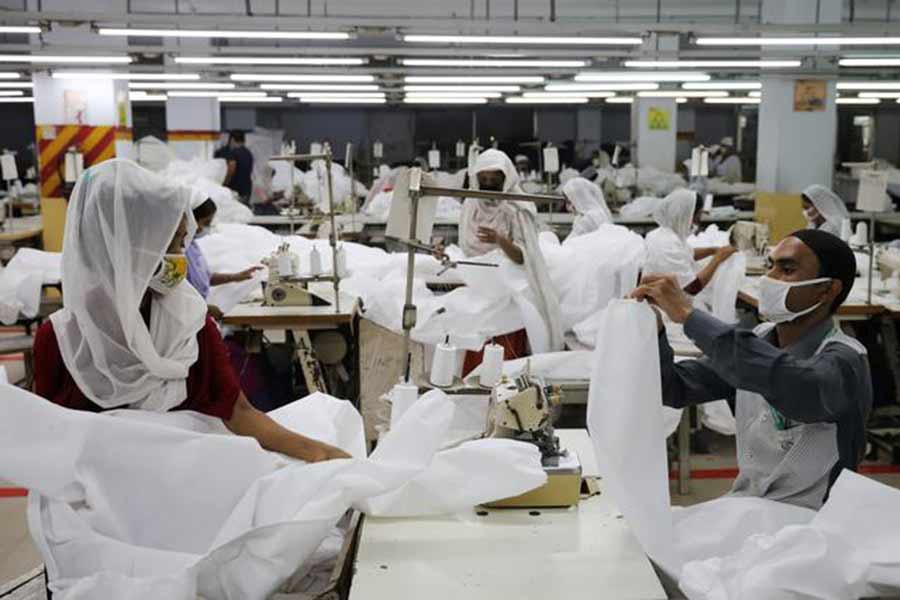Buyers redirecting some cancelled orders to Bangladesh’s competitors

Published :
Updated :

Western buyers are diverting orders for readymade garment (RMG) items to Bangladesh’s competitor countries amid deteriorating law and order following the change in power, worker dissatisfaction, protests, strikes, and factory closures.
At a press conference on September 12, Labour and Employment Advisor Asif Mahmud Shojib Bhuiyan said approximately 15 to 20 per cent of garment orders have been cancelled amid worker unrest.
Discussions with industry leaders reveal that the cancelled orders are being redirected to Bangladesh’s competitor countries, including India, Vietnam, Sri Lanka, Indonesia, and Pakistan, according to a bdnews24.com report published on Sunday.
Bangladesh Garment Manufacturers and Exporters Association (BGMEA) President Rafiqul Islam said that approximately 30 per cent of garment orders have moved to other countries.
With production plummeting, orders shifting to neighbouring countries, revenues shrinking, and dependence on bank loans increasing, many large companies in the garment sector are now facing the risk of permanent closure.
There are around 2,800 garment factories in the country directly involved in garment exports.
On Sept 12, due to the continuous worker unrest and unstable conditions, authorities declared an indefinite closure of 86 factories in the Ashulia industrial area and a general holiday for 133 factories.
On the same day, a government press conference revealed that more than 50 factories had been shut down indefinitely. Every day, numerous factories remain closed, leading to the cancellation of garment orders.
Last week, the five factories of Asrotex Group, an export-focused garment manufacturing company, could only achieve 19 per cent of their production target. The ongoing worker unrest is making it impossible for them to fulfil the purchase orders they have for the next three months.
The Group’s Managing Director Asadul Islam expressed his helplessness, saying that if the situation continues like this, they may have to consider closing the factories entirely.
“The workers aren’t listening to us. We have to follow their demands. We’ve declared a three-day layoff, yet the workers are demanding wages for those days too,” he said.
Asadul referred to the workers' demands as "daylight robbery".
Asrotex, which employs around 21,000 workers, exports garments worth $15 to $16 million every month. However, in September, the workers only worked 16 out of the 26 scheduled working days.
He also said that they are now taking bank loans to pay the workers’ wages. "How long will the banks keep lending us money? We’re seriously thinking about closing down the factories. If this continues, we have no other option."
Asadul Islam, the Asrotex Group MD, expressed a greater concern beyond the decline in orders. "If things continue like this, the entire industry won’t survive," he said.
Shovon Islam, Managing Director of Sparrow Group of Industries, echoed similar concerns. His group exports garments to 40 buyer companies across 20 countries.
Shovon said, “Typically, buyers assume such problems will be resolved within 4-5 days, or at most a week. But more than a month has passed without any solution. We accepted the workers' 18 demands, but they keep adding more. It’s very disappointing.”
He warned that if the situation persists, the industry will face an "existential crisis".
“To be honest, orders don’t come overnight. Orders are booked three months in advance. But we are unable to produce. What’s the use of getting orders if we can't execute them?”
Shovon further added, “For 10-20 per cent of the orders, buyers have already said they don’t need them anymore. Buyers are no longer negotiating new deals.”
He also noted that while the worker unrest initially started in Ashulia, it is now "spreading to various parts of the country”.


 For all latest news, follow The Financial Express Google News channel.
For all latest news, follow The Financial Express Google News channel.